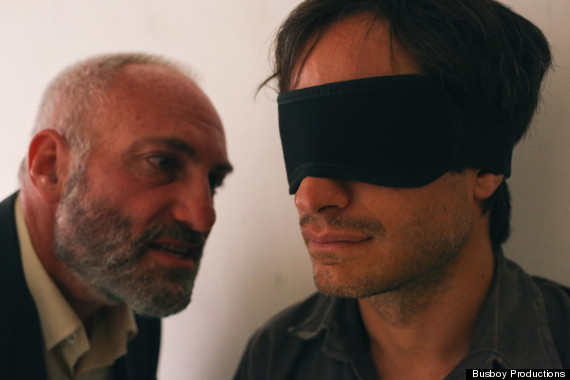"He has to satisfy his boss. He has a time sheet. Torture is a job like any other job."
After hosting "The Daily Show" for decade and a half, directing a film about torture looks like an extreme move for Jon Stewart. But "Rosewater" is less of an anomaly than it might initially seem. The narrative is very much in stride with combatting the things Stewart deconstructs on Comedy Central. Maziar Bahari's story is just something he was drawn to spending a little more time with.
But it's impossible to ignore the role "The Daily Show" has played in Bahari's life. After appearing on a segment with Jason Jones, Bahari was arrested by the Iranian government and imprisoned for 118 days, 107 of which he spent in solitary confinement. Except, it wasn't really guilt that drove Stewart to adapt Bahari's book, "Then They Came For Me," for the screen. Bahari was already being tracked prior to his "Daily Show" appearance, and the reality is that he was one of thousands in a similar situation.
Stewart told HuffPost Entertainment that he felt more "astonishment" over the situation than anything else. "I definitely felt responsibility in the sense of what can we do to help," he said. "Maziar was not the only one arrested."

Yet Stewart wants audiences to leave "Rosewater" with a sense of hope or, as he put it, "a great sense of optimism in the lack of sustainability of these types of regimes."
"It’s Maziar’s story," he said," But it’s also a more universal treatise on the difficulties of these regimes building these giant apparatuses designed almost entirely to suppress their people from expression."
Humor is what allows Bahari to exit his confinement relatively unscathed. His ability to see the absurdity in his tragic situation lends the story that counterintuitive feeling of optimism after 103 minutes of torture.
"I asked myself: How could I stop him from beating me and insulting me?"
Bahari entertained himself with the stories he told his torturer (a man he dubbed Rosewater, played by Kim Bodnia). During each session, Barhari would have to share something that wouldn't incriminate him while also satisfying the need for information. In that regard, Bahari compared himself to a "modern day Scheherazade."
"For me, it was a form of entertainment," Bahari said. "At the same time, I felt that I was mischievously torturing my torturer through those stories."
By tying in sexual elements to his tales, Bahari kept his interrogator satisfied and steered clear of more serious charges. "How obsessed they are with sex is unbelievable," he said. "I don’t know if you can even print it, if I tell you these stories. It's just so absurd."
Bahari says it was a "stroke of genius" (no pun-intended), when he came up with the idea of telling his torturer he was obsessed with erotic massage. He incorporated elements of 20th century Austrian literature, making the narratives of authors like Arthur Schnitzler more pulpy to excite the man who pounded him for questions day after day.
"I asked myself: How could I stop him from beating me and insulting me?," he said. "Then, how could I say something, give him some sort of information that he could take back to his boss and say that he’s happy?"

"Whenever you think you have a monopoly on truth, you are funny. You're ridiculous."
Bahari understood the reality of extracting information as tedious and bureaucratic. In all his time in prison, Bahari never thought of himself fighting against the regime. Instead, he saw his situation as an interaction with a person who was just trying to do his job.
"He is a torturer," Bahari said. "He works in an office. They have a torture institution. He gets paid for it. He gets overtime for it. He has to satisfy his boss. He has a time sheet. Torture is a job like any other job. And in order to exploit their vulnerabilities you have to look at it from their point of view as well. What do they want? What do they want to achieve?"
Stewart found interesting ways to highlight that banality with "Rosewater." In one scene, Bahari (played by Gael Garcia Bernal) is forced to call his wife and tell her to stop speaking publicly about his situation. Rosewater berates him physically and emotionally, before pausing to say: "You have to dial '9' to get out."
"It’s sort of that expression of, yeah, he’s torturing him, but you really do have to dial '9' to get out. It’s an office. It’s a job," Stewart said, echoing Bahari's earlier terminology. "I think it’s the juxtaposition of those expectations of what a torture facility looks like and the reality of just how bureaucratic and banal they are and that’s where the humor comes from."
It's that humor that Stewart hopes we will see as not just the singular eccentricity of the Iranian government, but all regimes that seek to suppress thought. Being able to figure out what got Bahari through his 118 days is a beacon of hope for resilience in the face of even the most oppressive institutions.
"Whenever you think you have a monopoly on truth, you are funny," Bahari said, smiling over the question of how he survived the time he spent with Rosewater. "You’re ridiculous."
"Rosewater" is in theaters nationwide Friday, Nov 14.
